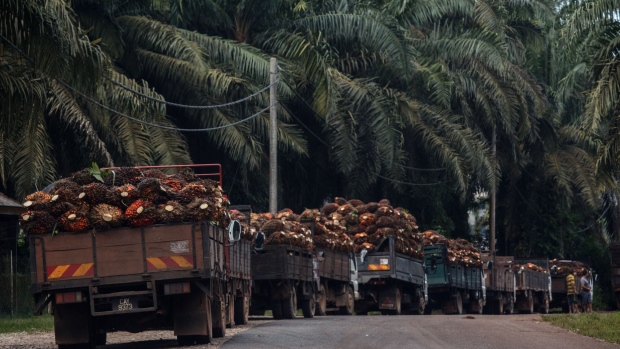Mar 4, 2024
Malaysia Sees Asia, Africa Taking Palm Oil Europe Doesn’t Want
, Bloomberg News

(Bloomberg) -- Malaysia, the second-biggest palm oil producer, expects Asia and Africa to soak up any supply that becomes available from export disruptions to Europe after the bloc’s new deforestation laws come into effect.
The European Union has put in place rules that stop products causing forest destruction from being sold in shops and supermarkets. Most companies have until the end of the year to comply with the EU Deforestation Regulation, which covers commodities from palm oil to cocoa and coffee. Critics say the rules especially punish smaller farmers.
Read More: Chocolate Faces Price Jolt as Deforestation Law Starts to Bite
EU imports of palm, used in everything from ice cream to shampoo and fuel, already dropped about 5% last year, with shipments from Indonesia, Malaysia and Thailand, the largest growers, particularly hit. But that loss will be offset by increasing demand in Asia and Africa, where the population is rising, said Carl Bek-Nielsen, chairman of the Malaysian Palm Oil Council.
Prices of palm oil will hold in a range of 3,800 ringgit ($803) to 4,250 ringgit a ton this year, underpinned by supply shortages and strong demand for the tropical oil, Bek-Nielsen said in an interview in Kuala Lumpur on Monday. Benchmark futures closed at 3,938 ringgit. He is also chief executive director of United Plantations Bhd.
The EU regulations may “amputate” millions of smallholders from the supply chain, Bek-Nielsen said, as they don’t have the necessary tracking systems and are struggling with issues from aging trees to declining yields. The regulations should be delayed until they are made more inclusive for smallholders, which make up about 35% to 45% of production in Indonesia and Malaysia, and up to 90% in Thailand.
“This vehicle may have had good intentions, but it has severe blind spots and it is heading straight toward a huge brick wall,” Bek-Nielsen said. “We have not fully appreciated the complexity of the supply chain involving smallholders.”
©2024 Bloomberg L.P.






